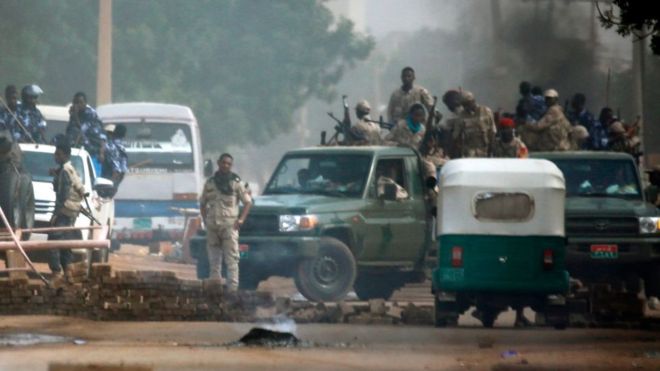
The number of people killed in a crackdown on pro-democracy protests in the Sudanese capital Khartoum has risen to 60, an opposition group says.
Members of a feared paramilitary group are reported to be roaming the streets attacking civilians.
The violence began when forces of the Transitional Military Council (TMC) opened fire on unarmed protesters on Monday.
The military has faced international condemnation for the attack.
Many Khartoum residents blame the Rapid Support Forces (RSF) for the violence. The paramilitary unit – formerly known as the Janjaweed militia – gained notoriety in the Darfur conflict in western Sudan in 2003.
Meanwhile, an attempt at the UN Security Council to condemn the violence was blocked on Tuesday by China, backed by Russia.
What is happening in Sudan?
Demonstrators had been occupying the square in front of the military headquarters since 6 April, days before President Omar al-Bashir was overthrown after 30 years in power.
Their representatives had been negotiating with the TMC and had agreed a three-year transition that would culminate in elections.
But on Monday, forces swept in to remove protesters from the square.
On Tuesday TMC leader General Abdel Fattah al-Burhan announced negotiations with protesters were over, all previous agreements were cancelled, and elections would be held within nine months. Demonstrators had demanded a longer period to guarantee fair elections and to dismantle the political network associated with the former government.
However, on Wednesday Gen Burhan made another televised speech in which he said the TMC was willing to resume negotiations.
“We regret the events,” he said, without elaborating.
Protesters had called for the Islamic festival of Eid al-Fitr, marked on Tuesday and Wednesday this week, to be celebrated in the streets, as a gesture of defiance against the military.
However, much of Khartoum is under lockdown. Witnesses said protesters had retreated to residential areas where they were building barricades and burning tyres.
Video shot on mobile phones showed columns of troops advancing through the streets.
What do residents say?
The Central Committee of Sudanese Doctors earlier gave a death toll of 40, but revised the figure to 60 on its Facebook page on Wednesday.
Protest organisers, the Sudanese Professionals Association (SPA), accused the TMC of carrying out “a massacre” and urged its pro-democracy supporters to continue protesting peacefully.
One Khartoum resident, who declined to be named, told the BBC that people were living in fear as reports of atrocities spread.
“We have reached the point where we can’t even step out of our homes because we are scared to be beaten or to be shot by the security forces,” she said.
Her uncle had witnessed three young men being executed in the city, she said.
Another resident, who also asked not to be named, told the BBC he was pulled from his car by members of the Janjaweed and beaten on his head and back.
Large numbers of heavily armed troops were also reported on the streets of Omdurman, Sudan’s second-largest city, just across the River Nile from Khartoum.
A woman, identified only as Sulaima, told the BBC that troops from the Rapid Support Forces were “all over Khartoum”.
“They’re surrounding neighbourhoods, they’re threatening people. They’re also using live ammunition. They’re everywhere. We’re not feeling safe and we don’t have trust in the security forces. It’s complete chaos.”
The RSF commander, Mohammed “Hemedti” Hamadan, is a close ally of the United Arab Emirates and Saudi Arabia, Reuters reports, and has sent troops to join the Saudi-led coalition fighting in Yemen’s civil war.
What happened at the UN?
The UK and Germany had circulated a draft statement at the UN Security Council condemning the deaths of civilians and urging Sudan’s military and protesters to “continue working together” towards a solution.
China rejected the text and Russia said the council should first wait for a response from the African Union.
After the move was blocked, eight European countries issued their own joint statement condemning the attacks “by Sudanese security services against civilians” and calling for a transfer of power to a civilian-led government.
How did the crackdown start?
Security services moved into the main protest site early on Monday. In a televised statement, the military council said the operation had targeted “trouble makers and petty criminals” and that they were dedicated to protecting civilians.
The SPA responded by calling for a campaign of sweeping civil disobedience.
Speaking on BBC’s Newsday, the analyst and former British ambassador to Sudan, Rosalind Marsden, said the snap election would “simply pave the way for much of the old regime to come back into power”.
“There’s a real risk of violence continuing,” she said.
Source: BBC


